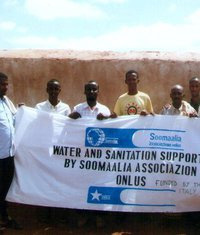Reduction of malaria incidence in the rural area in the district of Gado, Somalia

The general objective behind the project is to improve health conditions of Somalia 's most isolated areas ,while the specific objective is to reduce morbidity and mortality rate linked to malaria and contemponeously reducing vulnerability linked to other parasites through education of the masses for example using mosquito nets, use of insecticides and water treatment ,where mosquitoes reproduce mostly.
The programme is being put to use in the region of Gedo and it's eight districts (Gedo the regional capital, Bardera, Lugh, Dolow, El-adde, Elwak, Burdhubo and Belet-hawa) is among the biggest in Somalia. We particularly operated in the district of El-adde, one of the most populated (population of about 25000 distributed in 38 villages. The population is mostly dependent on livestock farming and seasonal agriculture. It is a strategic point since it's located between four regions namely Bay, Bakool, Middle Jubba and Gedo and has developed comercially.fortunately the district has not been gravely affected by civil wars that characterized most areas of the Gedo region. However this relative peace status has increasingly worsened since 2009 due to extreme difficult caused by drought, has put the residing populations to the test this economy based on agriculture and forestry.
Due to non or fragile health infrastructure, NGO (non governmental organization) local partner ARD, has offered basic structure to reduce through prevention malaria incidence, though this is the strategy advised by WHO(WORLD HEALTH ORGANIZATION),it is evident how as how ,in the absence of adequate health infrastructure ,this determines an unsustainable case of curing rather than preventing.
We, however, would like to underline the importance of having worked and working with the local NGO, with aim to strengthen and acknowledge it's leading role even small yet concrete activities in favour of the vulnerable local populations. in the current Somali context, even in light of ever increasing political tensions certainly aggravated by drought, NGO proposes strategic empowering and giving credibility to those who are able to work diligently in their own communities, so as to reinforce few so as to allow in the meantime, bases for development, conservation and peace in the country.
- Having defined the context and problems associated, and isolated the most urgent cases within the 13 villages among the most needy families, i.e. pregnant women with children 5yrs or less, primary school students and orphans in orphanage situated in the regional capital: the project aims to fulfill the following
- to organize group courses , in the 13 villages, aimed at identifying malaria transmission and risk reduction(behavioral analysis) .Paying particular attention to the importance and use of mosquito nets, in line with WHO indications and water treatment
- List of eligibility through which people that qualify will be given mosquito nets, high on the list being pregnant women, 5yr or less minors, primary school kids
- Distribution of mosquito nets by involving the communities and courses for correct usage on a community level
- Distribution through the village counsel of non harmful insecticide and long lasting treatment of water reservoirs
- First, run formation courses in the 13 villages on treatment of stagnant water good behavioral practice on how to eliminate stagnant water near their homes.
- Effecting disinfestations campaign in each and every village
Our local partner the NGO -ARD(ACTION FOR RELIEF),a non profit organization, non political, constituted in 2003 and with a headquarter at Gedo, ARD is actively cooperating with Finish church aid (FCA) and the Norwegian church aid (NCA).
Together with FCA AND NCA, ARD make and maintains wells in the district of El-gudud and El -adde in the region of Gedo.
ARD also collaborates with various organizations of Somalia’s residing in Europe, United States and Canada, among which Somali Agricultural and Education Development Association (SOEADA-SEURA-RY) based in Finland that will also collaborate.
Particular emphasis will be directed towards health sector ,1650 families, the most vulnerable, will benefit from the project through distribution of mosquito nets, privileging pregnant women and mothers with infants, in addition mosquito nets will be distributed to all the 750 students at the school in EL-adde and 100 orphans at the local orphanage.
Thanks to the major care, preventive measures and the disinfestations process in the El-adde comunity, 25000 inhabitants, there has been drastic morbidity reduction.
Our association, collaborating indirectly with the local NGO well known and respected locally, a strategic choice, has been easier to overcome so many difficulties and risks that other organizations encounter ,and having a larger visible infrastructure ,even in difficult periods didn't have to suspend works only slowing down or redirecting efforts in communities affected by drought and by migration.
Following in order are the initially proposed projects and carried out:
organization in the 13 villages of special groups ,aimed at training about the disease, vectors and how to reduce(behavior practice) in order to reduce the risk by transmission. Particular care will be emphasized on the use and importance of mosquito nets, in accordance with the world health organization and water treatment in various areas.
We have employed the locals in realizing this project, i.e. Project coordinator, administrator and the instructor for environmental hygiene. The coordinator has promoted this campaign through various meeting in the communities of the 13 villages with small groups aimed at realizing specific goals pertaining to the project.
In particular during the promotion phase, realized in the first weeks of the project, specific details were given regarding the reasons and how to put into effect the project, paying attention to type of activities to be carried out in reference to critical conditions that from which followed the necessity of the project. During this phase, detailed technical assistance on environmental hygiene was affected, successively in different areas of the project.
A total of 41 meetings on information and promotion in various communities were carried out.
The definition of a list of people selected for the consignment of mosquito nets, privileging pregnant women, minors age less than 5yrs, and primary school kids and orphans
With the collaboration of the selected groups and counsel of elders, the coordinator identified the initial list of beneficiaries during the project, integrating, community by community. The list were further shown to the communities for any additional integration and issued out during other community meetings.
Consignment of mosquito nets by involving the community and courses for correct usage on a community level
We procceded to buy, stocking in warehouse and then later distributed 2500 mosquito nets in all the selected communities and 13 courses were effected on the correct usage in the presence of all the people, educational institutions and the beneficiaries during these occasions, small moments of partying were organized with food prepared by women taking some of the cereals granted by the project.
Consignment of non harmful insecticides through the counsel of elders for water treatment
Special courses on usage and on water treatment. Courses have been carried out specifically on usage and water treatment by a technician in each counsel meeting with a complessive participation of more than 80 people. Even in these meeting food was issued.
Realization of the first 13 courses in the communities for treatment of stagnant water and for good behavioral practice for prevention in particular on the disposal of stagnant water at homes.
The same courses were repeated successively in the 13 villages by the technician and the courses lasted two days each.500 women participated and each and everyone was fed during the courses as prescribed by the project.
Realization of re-development campaign in every village
With materials on disposal, requalification of the 13 villages was done by not only the trained personnel, but with collaboration of school kids -abandoned water containers were collected, cleaning of drainage pipes, pulverization .700 people participated, minors were given deductive materials and all the participants were fed during this operation.
Obstacles and barriers
Immediately after the beginning of the project, like the meeting with the counsel of elders and mobilization of the community, the political scene worsened.
El-Adde, known for being political stable in the southern part of Somalia, the only town that never had any war experiences two days after the new year, had it's first share of chaos and war began through the war brought by the Kenyan troops’ air raids and ground artillery, claiming they were fighting against the Al Shabab militants.
The long standing peace in the community was therefore interrupted, many in fear for there life fled away.
All humanitarian aid was stopped and humanitarian organizations personnel evacuated.









